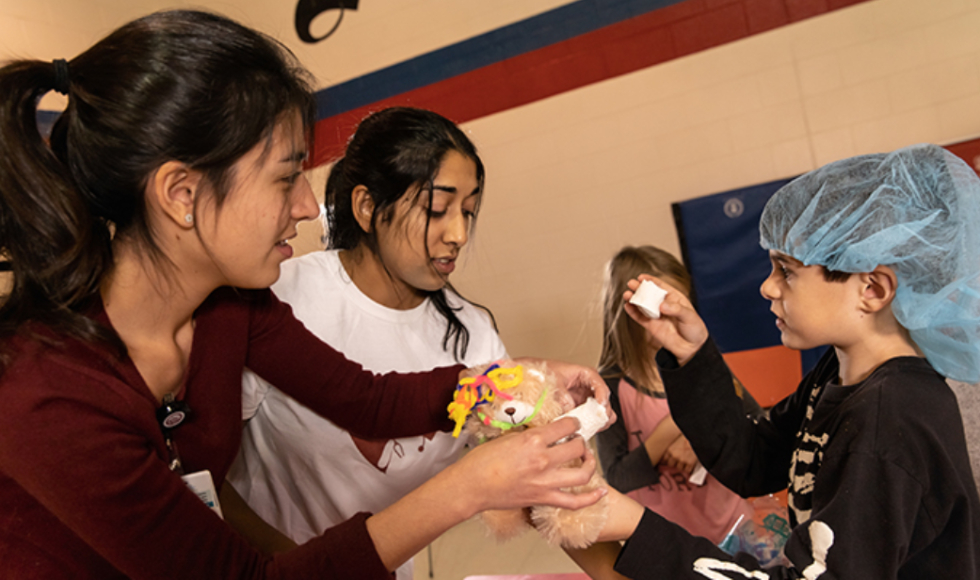Fostering the ties in our community

McMaster medical students Victoria Liu and Nisha Goel apply a cast to the teddy bear of Keegan Pearce, 9, at the Teddy Bear Clinic in Thorold.
McMaster University’s medical school campuses in Hamilton, Niagara and Waterloo are woven into the fabric of their communities.
From undergraduate medical students in family medicine clinics to residents in McMaster Children’s Hospital, they impact the quality and availability of care in the health-care systems where they learn and work.
Beyond the clinic doors and surgical suites, these learners are also part of the cities they inhabit. They can be found providing care at inner city health centres, teaching kids about medicine using teddy bears, and learning by socializing with lonely older adults.
Hamilton has been home to the lion’s share of the 5,743 undergraduate medical graduates and 7,400 post-graduate residents who have travelled through the Michael G. DeGroote School of Medicine.
“Most of our students find Hamilton a place they want to live and learn,” said Rob Whyte, associate dean, undergraduate medical education, and a McMaster MD ’97 alumnus. “It’s a good balance between the larger cities that have a lot of resources and the smaller cities from where many of the students come.”
Whyte says learners have arguably the most significant impact on the city when working with community partners.
“Our medical students have developed partnerships where they work directly to support care of others,” said Whyte. “One example of a partnership we have is at Hamilton Urban Core, a community health centre that provides care to people who are living on the street, are vulnerably housed, or are immigrants or refugees. Our students help provide care for their clientele.”
Other such community partnerships see McMaster medical students going into elementary and high schools talking to kids about careers in health care; helping administer vaccines to immigrants and refugees; working with underprivileged children, and assisting food bank clients to find healthier meals based on what’s available on the shelves.
%20(1).jpg)
At any given time, there are also approximately 1,225 post-graduate learners affiliated with McMaster’s medical school.
Parveen Wasi, associate dean, postgraduate medical education for the Faculty of Health Sciences, says that residents and fellows are integral members of the health care team in the Hamilton, Kitchener-Waterloo and Niagara campuses. As well as providing care to our communities, postgraduate learners play an important role in teaching and mentoring junior learners, she adds.
“We have some of the best medical residents and fellows in Canada working here in our hospitals, clinics and health centres through McMaster’s postgraduate program,” said Wasi, who completed her own postgraduate medical education at McMaster. “They provide skilled care for everything from family medicine to pediatric neurosurgery, forging trust with the patients they serve in small and large centres.”

The Class of 2020 will be the 10th graduating class of the Niagara Regional Campus of the Michael G. DeGroote School of Medicine.
The campus has graduated more than 230 physicians since it opened as well as had more than 100 medical residents in family medicine, emergency medicine and general surgery.
Faculty members include more than 350 Niagara-based physicians from all regional hospitals and many community-based clinics, which is a point of pride for Amanda Bell, regional assistant dean at the Niagara campus and a McMaster MD ’98 alumna.
“There has always been medical excellence in Niagara, but we’ve been able to help advance that as we have become a magnet for highly-qualified physicians who are excited and want to teach,” said Bell. “This has been the biggest impact we’ve made on our community. ”
Learners are encouraged to get involved in their community above and beyond their required hours in the classroom and health-care settings.
One such example is the undergraduate medical students who host annual Teddy Bear Clinics in partnership with the Boys and Girls Club of Niagara. The medical students use teddy bears to teach Niagara children about health.
Bell said it is this community interaction and high-calibre learning that has resulted in the Niagara campus seeing a steady increase in its graduates returning to the region to practise and becoming McMaster faculty members.
“At least a quarter of our first graduating class of undergraduate medical students are now back working in the area and we currently have two members of our campus executive in leadership positions who were among that first graduating class of 15,” she said.
Founded in 2007, the Waterloo Regional Campus has educated close to 260 undergraduate medical alumni. Learners also include postgraduate trainees in emergency medicine, family medicine, internal medicine, pediatrics and psychiatry.
“When it comes to our learners, there’s a positive impact on patient care,” said Margo Mountjoy, regional assistant dean in Waterloo and a McMaster MD ’86 alumna. “We’ve had everyone from emergency physicians to psychiatry graduates stay in the region, and, of course, there are many who stay in family medicine.”
One hundred and fourteen McMaster medical graduates, including 16 from the undergraduate MD program at the Waterloo campus, are practising in the region. Including part-time, there are 710 faculty appointments at the campus.
To build better relationships between future physicians and older adults, a successful elder care education program is also being rolled out at the Waterloo campus. Among the numerous related initiatives is the Green Bench program which includes a green bench featuring the words #ElderWisdom where students and older adults can sit and talk. The bench is a symbol of breaking down generational barriers.
Mountjoy added, “The students here in Waterloo enjoy the fact they have strong learning experiences from both their preceptors and from community members themselves.”



